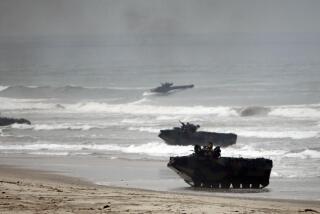Devil of a Summer Camp : Teen-Age ‘Pups’ Get a Taste of Marine Discipline at Pendleton Base
- Share via
CAMP PENDLETON — Some come from the riot-torn streets of Los Angeles, some from pleasant suburban communities. But when they arrive, all are greeted equally by a man standing one inch away and screaming instructions in their faces.
Self-confessed gangbangers, screw-ups, high achievers and just plain curious teen-agers voluntarily sign up for “Devil Pups,” a 10-day, mini-boot camp held at the Marine Corps base.
Juan Banuelos, 16, a veteran of the riots, said he would be with his fellow gang members if he weren’t with the Devil Pups.
“I would be stealing or something,” said Banuelos, who heard about the program from a Los Angeles police officer he knows.
A 17-year-old from Echo Park who asked that his name not be used said that he had looted during the riots and didn’t feel good about it. The Pups, he said, offered a sort of cleansing.
“I love everything about these Marines,” said the Belmont High School student. “They are hard, but they make me feel that I belong.”
The Devil Pups program was begun in 1954 when Marine Col. Duncan Shaw Sr. saw a youth burn the American flag and decided to do something to teach youths about citizenship, Lt. Col. Ken Moore said. There are no similar programs anywhere else in the United States, he said.
Last year, more than 600 teen-agers, mostly from the Southwest, attended the rigorous program, including daily running, swimming, marching and citizenship classes, held on the actual training grounds for Marines.
Only boys of ages 14 through 17 are accepted. Former Maj. Mike Waddell, a Marine veteran who volunteers for the program, said that girls are not allowed because none of the volunteer trainers are women and “it would need women volunteers to run it.”
“It’s been an all-boys program all along,” Waddell said. “We would help start (a girls’ program) if someone were to come along and want one.”
Each boy undergoes a background check to make sure he is not a repeat offender who might influence the other boys, Moore said.
The cost of training each youth is estimated at $350 and includes free transportation between the base and anywhere in California. The program is funded entirely by donations from charitable foundations, corporations and individuals.
Waddell, who has watched teen-agers go through the Devil Pups program for 22 years, said that “most of them go on to college, and some even join the Marine Corps.” But virtually all of them leave feeling better about themselves, he said.
“Some of these boys have never really accomplished anything until they come here, and they are grateful,” Waddell said.
A teen-ager from Orange whose parents sent him to the program because he was “always messing up” said he was shocked when a Marine told him those days were over.
“He screamed at me and scared the hell out of me,” said 14-year-old Chris Drake.
Not all of the teen-agers even make it through the program. One boy was sent home this summer after he apparently picked up a 40-millimeter shell at one of the firing ranges and hid it in his pocket before it was discovered by a Marine supervisor. Last year, nine Pups either were sent home or quit, Waddell said.
Some find the exercises almost too grueling.
As the Pups lined up to jump off a 35-foot tower into 12 feet of water recently, one of the boys simply froze and could not be coaxed to even climb the platform.
Finally, after an hour of pep talks by one of the staff sergeants, the 14-year-old warily climbed the tower’s wooden rungs.
As mortar fire boomed in the background, Joshua Crain of Lake Arrowhead looked down at the water and clasped his hands to his eyes while the sergeant whispered encouragement. With 300 other youths shouting Joshua’s name and two Marines waiting in the water, the sergeant counted to three and the boy took one last look . . . but didn’t jump.
After he climbed down from the tower, Joshua walked over to the sergeant with his head down and said, “I’m sorry. I let you down, sir.”
The muscled sergeant looked down at the disappointed youth and put a hand on his shoulder.
“No, you didn’t,” he said. “At least you made the attempt.”
More to Read
Sign up for Essential California
The most important California stories and recommendations in your inbox every morning.
You may occasionally receive promotional content from the Los Angeles Times.










